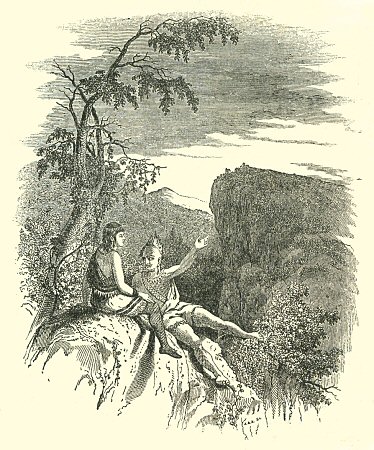“The Indian’s Story” (from Robert Merry’s Museum, January 1850; pp. 23-24)

Listen, Meena, and I will answer your inquiries. Long, long ago, these hills and valleys were our father-land. Numerous as the leaves were our people; free as the winds were they, when they roamed over meadow and mountain. This spot was at first Manitto’s dwelling-place. He chose it, for it
-----
p. 24
was the fairest in the land. In yonder gorge was a waterfall, which the deity loved to behold. There he often came, and he sat upon the high cliff, and the cloud gathered its folds around him, and he seemed awful in his majesty. And the lightning flashed from his eye, and the thunder rolled down the mountain at his feet, and the eagle came and poised himself upon the shoulder of the god, and the cloud rolled away, and the deity vanished, and the sweet bow of many colors was in the sky; and then it came and played in the spray of the cataract, and there it lingered when the sun was bright, or when the moonbeams fell fair.
And spring came here before it visited other lands; for so Manitto decreed. And here summer was longest and fairest; and here autumn shed her richest fruits. In the valley, the forests rose thick and tall, and gave shelter to innumerable deer; on the mountain was the walnut, the chestnut, the beech, and the butternut, which covered the ground with their fruits, and fed thousands of squirrels and partridges.
Now, our fathers pleased Manitto, for they were the bravest of the nations in battle; so he bequeathed to them this country, which he had chosen for himself. And for long, long ages, it was theirs. Here they dwelt in joy and triumph.
But at last they became weak. Their warriors grew indolent, and loved the chase better than battle. They preferred peace, clothed themselves in rich furs, and lay on beds of beaver skins, and down of the swan and pelican. Thus was Manitto’s favor changed to anger, and thus the ruin of our fathers approached.
A people came over the sea, from regions which give birth to the morning, the sun, the moon, and the stars. And the light was in their veins, and the ruddy dawn glowed in their cheeks, and they came with weapons which hurled the thunder and the lightning upon their enemies, and our fathers were slain in many battles. Their corses were thrown on the stream, and their war-cry was drowned in the roar of the cataract; the eagle feasted on their slain, and the haggard wolf stole from his cover, and shared in the horrible meal. Manitto fled, and, cursing the land, left it in judgment to the pale faces.
And see! the hills are shorn of their forests; the lofty trees have disappeared from the valley; the deer has fled; the stream, once so wild and beautiful, is now used only to turn the mill and the wheel of the factory. Where Manitto sat on the cliff, is now a place of worship for these infidels, who are deluded with strange idols. Our hunting-grounds are sown with corn, wheat, and rye; the domain of the squirrel and the partridge is covered with gardens and villages. Alas! how are the homes of our ancestors desecrated! How has the curse fallen upon our father-land!